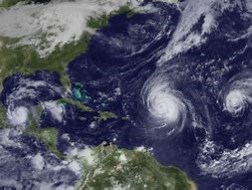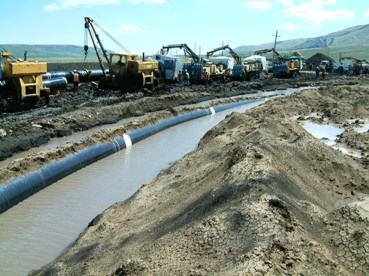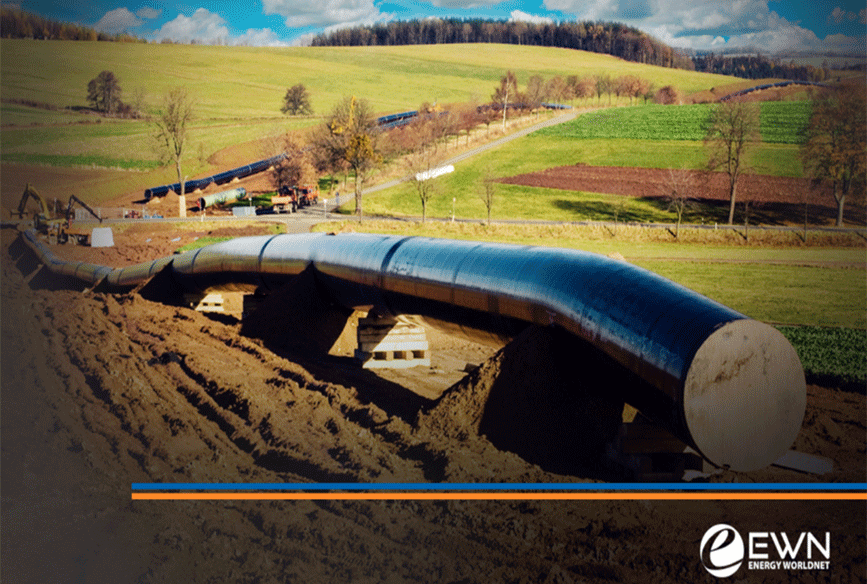Pipeline Safety during Hurricane Season

October 2018
As an employee of ACI, it is your responsibility to report injuries immediately (Within 24 HRS) to appropriate field personnel and also: ACI Safety Department (903) 643-0956.
Pipeline Safety during Hurricane Season
With hurricane season upon us, there are many factors that we need to consider to stay safe while working out in the field. In 2012, there were 19 tropical storms and 10 of those became hurricanes, with Superstorm Sandy being the worst for the oil and gas industry.
 Wind and flooding caused damage to critical fuel facilities such as terminals, pipelines, storage facilities and truck racks, as well as to the electric power infrastructure that energizes those facilities. Docks, control systems, vapor recovery units, and electric switching gear within facilities were some of the supporting infrastructure that sustained serious damage. Replacement of parts and components and the complexity of the systems required time and technical expertise to safely restore services. At the height of the storm, 6 east coast refineries were either shut down or at reduced runs, several product pipelines were down and 24 terminals were impacted. More than 8 million customers were without power in 21 states, including the District, with more than a million each in New Jersey, New York and Pennsylvania. In addition to the impacts of Sandy, beginning November 7th, a Nor’easter impacted the Mid-Atlantic and Northeast with strong winds, rain or snow, and coastal flooding. The oil and natural gas industry worked in coordination with government partners to restore critical services and by the end of November, all refineries were running at normal levels, only 2 terminals remained out of service and all pipelines servicing the area were in operation.
Wind and flooding caused damage to critical fuel facilities such as terminals, pipelines, storage facilities and truck racks, as well as to the electric power infrastructure that energizes those facilities. Docks, control systems, vapor recovery units, and electric switching gear within facilities were some of the supporting infrastructure that sustained serious damage. Replacement of parts and components and the complexity of the systems required time and technical expertise to safely restore services. At the height of the storm, 6 east coast refineries were either shut down or at reduced runs, several product pipelines were down and 24 terminals were impacted. More than 8 million customers were without power in 21 states, including the District, with more than a million each in New Jersey, New York and Pennsylvania. In addition to the impacts of Sandy, beginning November 7th, a Nor’easter impacted the Mid-Atlantic and Northeast with strong winds, rain or snow, and coastal flooding. The oil and natural gas industry worked in coordination with government partners to restore critical services and by the end of November, all refineries were running at normal levels, only 2 terminals remained out of service and all pipelines servicing the area were in operation.When working in an area that a hurricane could potentially hit, it is imperative that you follow the proper safety procedures in place. Your crew needs to have an established Plan of Action BEFORE a threat presents itself. Within that plan, there should be a damage survey and repair team organized and know which non-essential personnel will be evacuated. The core group that stays behind should begin shutting down production, securing equipment and working with utilities to clarify priorities for electric power restoration critical to restarting operations and to help minimize significant disruptions to fuel distribution and delivery. During the storm, the core group would need to evacuate and remotely monitor and operate equipment as needed.
After the storm, there should be inspections of the pipeline infrastructure ASAP. Once safety concerns have been assessed, work crews may return to evaluate the damage and begin executing a remobilization plan. In most cases of a state of emergency, you will be required to keep on hand a Re-Entry permit. Once back on the job-site, you should have heightened awareness of your surroundings as there may be additional hazards due to damage and flooding.

To continue tracking storm activity throughout the season, check out:
ESRI’s:
Hurricane and Cyclone Public Information Map
PHMSA updates
Texas evacuation routes
Louisiana evacuation routes
STOP WORK AUTHORITY
Stop Work Authority is a policy that empowers all workers to stop work, notify, correct, and resume approach for resolving the situation if a hazardous condition exists. Under federal law, employers must provide a safe and healthful workplace free of recognized hazards. That means that you, as an employee, are protected against employer retaliation if you deem the work environment unsafe. Never assume that another employee is going to report the situation and mitigate the problem. As an Inspector, or ACI employee, it is your responsibility to ensure the safety of yourself and others around you. Make safety your number one priority so we can all go home at the end of the day, every day.
REPORTING INJURIES
As an employee of ACI it is your responsibility to report injuries immediately (Within 1 HR) to appropriate field personnel and also to ACI home office (903) 643-0956.
The most important reason that we ask you to report all injuries is to allow us to arrange for prompt medical treatment. Proper medical care is important to reduce the possibility of a minor injury becoming worse. The cable that breaks can start from just a few broken strands.
Along with reporting Injuries, reporting “near misses” are just as important. For every serious accident, there are a greater number of minor accidents and near misses. When a near miss is ignored, the odds escalate that a serious accident will occur. Uncontrolled hazards are pre-sent in every working environment. We want to identify these hazards and cut out as much as possible. By reporting both injuries and near misses SAFETY AWARENESS will increase for you and your coworkers thus creating a better/safer working environment for all.

ENERGY WORLDNET—API 1169
As many of you are aware the API 1169 certification is one that is gaining acceptance at an overwhelming rate amongst a vast amount of owner/operators within the oil and gas industry. In fact many of these owners are requiring 25% of their inspection staff to be certified now and 75% by the end of this year. What this means is that these owners are preferring individual inspectors who are certified over those who are not. This is creating a higher employment opportunity for those that are already certified. Applied Cleveland Holdings is encouraging those who are not certified to start the process of attempting to get this completed.
We have partnered with API so that you will be able to obtain a discount for the cost of the exam. During registration within the ICP portal on API’s website put Applied Cleveland Holdings as your current employer and you will receive a $100.00 discount off the cost of the exam. To register for the exam please go to www.api.org and then enter the ICP (individual certification program) under products and services. Select apply in step 2 and follow the instructions that are listed. We have also partnered with Energy Worldnet (EWN) that has developed an amazing tool for preparation and we highly advise that you take this prep course to ensure that you pass the certification on your first attempt. We have included this information as well.
In preparation, Applied Cleveland Holdings has partnered with ENERGY worldnet (EWN), the trusted leader in compliance management and workforce development, for API 1169 Exam training. EWN’s Pipeline Inspector Training Program consists of fifty (50) computer based training (CBT) modules designed to fulfill the specific regulatory and training needs of pipeline inspectors throughout the industry and aligns directly with the published knowledge base requirements of the API 1169 Inspector Certification Program. Each course has been created with the inspector in mind to enhance the inspector’s knowledge of industry construction standards, best practices, and federal regulations. The training which is normally $895 will be offered at the discounted rate of $645, due to our relationship with EWN. The training modules will be accessible to you for a year upon registration. EWN’s industry leading system will allow for the training to be taken at anytime, anywhere as it is a computer based training that allows for flexibility in your schedule and lifestyle.
Once training is complete with EWN, you will be equipped with the tools to take and pass the API 1169 test. Due to the number of clients that are requesting 1169 Certified inspectors this will be a great addition to your resume and skill-set.
In order to take advantage of the negotiated pricing secured with this relationship with EWN, you must call (940.626.1941) and mention the discount code “CIS”. By doing so, an EWN representative will take your payment, register you and associate it with CIS automatically. Once registered you will be provided login information to access the system and begin taking advantage of EWN’s Pipeline Inspector Training Program immediately.
Test Dates Available:
12/7/18—12/21/18
(Register no later than October 5, 2018)
1/29/19-2/8/19
(Register by no later than November 23, 2018)
We have partnered with API so that you will be able to obtain a discount for the cost of the exam. During registration within the ICP portal on API’s website put Applied Cleveland Holdings as your current employer and you will receive a $100.00 discount off the cost of the exam. To register for the exam please go to www.api.org and then enter the ICP (individual certification program) under products and services. Select apply in step 2 and follow the instructions that are listed. We have also partnered with Energy Worldnet (EWN) that has developed an amazing tool for preparation and we highly advise that you take this prep course to ensure that you pass the certification on your first attempt. We have included this information as well.
In preparation, Applied Cleveland Holdings has partnered with ENERGY worldnet (EWN), the trusted leader in compliance management and workforce development, for API 1169 Exam training. EWN’s Pipeline Inspector Training Program consists of fifty (50) computer based training (CBT) modules designed to fulfill the specific regulatory and training needs of pipeline inspectors throughout the industry and aligns directly with the published knowledge base requirements of the API 1169 Inspector Certification Program. Each course has been created with the inspector in mind to enhance the inspector’s knowledge of industry construction standards, best practices, and federal regulations. The training which is normally $895 will be offered at the discounted rate of $645, due to our relationship with EWN. The training modules will be accessible to you for a year upon registration. EWN’s industry leading system will allow for the training to be taken at anytime, anywhere as it is a computer based training that allows for flexibility in your schedule and lifestyle.
Once training is complete with EWN, you will be equipped with the tools to take and pass the API 1169 test. Due to the number of clients that are requesting 1169 Certified inspectors this will be a great addition to your resume and skill-set.
In order to take advantage of the negotiated pricing secured with this relationship with EWN, you must call (940.626.1941) and mention the discount code “CIS”. By doing so, an EWN representative will take your payment, register you and associate it with CIS automatically. Once registered you will be provided login information to access the system and begin taking advantage of EWN’s Pipeline Inspector Training Program immediately.
Test Dates Available:
12/7/18—12/21/18
(Register no later than October 5, 2018)
1/29/19-2/8/19
(Register by no later than November 23, 2018)
Near Misses Reported in September
- The painting contractor was bristle blasting a newly installed valve under a cat walk. The worker was somewhat hidden from plain site due to the cat walk. An operation tech was in the area preparing to blow down a small section of pipe. The painters fire watch noticed that the technician was about to blow down the pipe, and stopped the painter from blasting so the technician could blow down the section if pipe.
Response: The crew had a meeting with the contractor and technicians to explain that some workers maybe hidden from plain site, and that everyone needed to check the affected area before performing a task. We also had a meeting the next morning prior to starting work to express that everyone communicates the area they will be working in during the day. Since that can change, we communicate the importance of everyone, even the fire watch, need to be aware of work in the surrounding area. This was a great example of using stop work authority, and shows that everyone on the job site should use it when they feel it is needed.
- While M-Scoping the row I noticed that the contractor was not marking known lines in the area, the contractor was stopped and upon discussing the lines that they had missed I realized that they did not understand how to work the equipment they where using.
Response: Work was stopped and I contacted the contractors supervision and requested another employee to run the equipment and verification that the employee was trained on the equipment being utilized.
- Congested area where work was being performed. Area was small and therefore I deemed necessary to park all equipment not in use in an area outside of where the work was going on.
Response: Ruled that only two pieces of equipment could be in the area at a time, if more was required a written review will be required of work steps and each piece of equipment will have a spotter.
- Contractor using man basket without being tied off.
Response: Stopped work and went over proper safety checklist.
- Employee Walked into x-ray area that was roped off without permission.
Response: Stopped all work and had a safety stand down with all contractors. Went over proper procedure and asked x-ray to provide taller cones and caution tape to prevent incidents.
- Contractor using a damaged belt to make a lift. Work was shut down.
Response: The belt was changed and took the old belt out of service.
- Boom hands were picking up on a section of pipe without foreman's permission. Welder directed the boom operator to pick up a section during welding. Ten minutes later the weld cracked-out causing the welders to be very shook up at the potential of injury. Luckily no one was injured.
Response: Work was stopped and a we had a stand-down meeting with crew and safety.
September Newsletter Winners
Gold: Tony Snyder
Gold: Travis Metz
Bronze: Hal Moffitt
Bronze: Jason Horton
Bronze: Allen Hinkle
Bronze: Eric Little
Bronze: Joseph Lakata
Bronze: Kenneth Cason Bronze: Rhance Gelo
Bronze: Phillip Cox
Silver: Durrell Dantin
Silver: Mark Hardin
Gold: Tony Snyder
Gold: Travis Metz
Bronze: Hal Moffitt
Bronze: Jason Horton
Bronze: Allen Hinkle
Bronze: Eric Little
Bronze: Joseph Lakata
Bronze: Kenneth Cason Bronze: Rhance Gelo
Bronze: Phillip Cox
Silver: Durrell Dantin
Silver: Mark Hardin